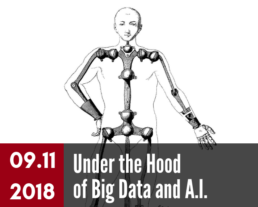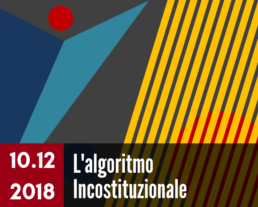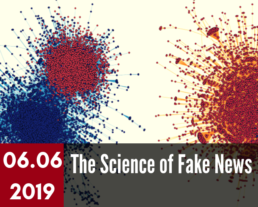Under the Hood of Big Data and Artificial Intelligence
Under the Hood of Big Data and Artificial Intelligence
Big Data and Artificial Intelligence have nowadays a huge impact in almost all scientific disciplines and, more in general, to our society.
Many are claiming that data is the “new oil”, and the data-driven / machine-learning paradigm is changing how we address many different problems. Self-driving cars, robot caregivers and chatbot platforms are really happening, while they were only popular sci-fi topics until a few years ago. Deep Neural Network architectures – trained on very large datasets (e.g. ImageNet) onto fast dedicated hardware (e.g. GPUs) – are the most popular approach and the main reason why machines can now recognize objects in an image, and translate speech in real time.
However, despite the impressive achievements of these technologies, big data and AI are often used and referred as to “black boxes”. The aim of this lecture is to introduce the key concepts that have led to the recent success of these techniques, to highlight what are the main challenges and open problems, thus trying to unveil what’s in the box.
Speaker: Lamberto Ballan
When: 9 November 2018, 12.30
Where: Aula Rostagni, Physics and Astronomy Dept., Via Paolotti 9, 35131, Padova
Check out the video of the presentation!
Here the slide with references:

The Unconstitutional Algorithm: Artificial Intelligenceand the Future of Fundamental freedoms
The Unconstitutional Algorithm: Artificial Intelligenceand the Future of Fundamental freedoms
Contemporary A.I. is powered by entirely new statistical methods and fuelled by a large amount of data, known as Big Data. Big data and machine learning impacts on business as well as on other several aspects of society, are prompting challenging shifts in decision-making processes, legal one included as some recent cases demonstrated.
An increasing role it is played by so called “predictive algorithms”, sort of contemporary oracles able to predict accurately the future but never saying why. In the lecture, I argue that constitutional law – if it wants to keep its own aim, that is regulating powers in order to protect freedom – must reflect on when and how to limit the asymmetry of power inevitably caused by differences in capability of computational power and data availability and on the discriminatory outcomes produced by decisions taken relying on biased algorithms.
By presenting some recent cases, I will highlight some critical aspects of the application of AI on judicial and administrative decisions with a particular focus on the problem of training bias. I’ll conclude reflecting on the radical transformations that are moving ahead at full speed, showcasing the main challenges that only through interdisciplinary approaches can be effectively tackled and outlining some of the fundamental principles of the “new constitutional law of the cybernetic era”
Speaker: Andrea Simoncini, University of Firenze
Date: 07/12/2018 12.30. Aula A, Physics and Astronomy Dept.

5 Reasons Why Social Networks Make Us Vulnerable to Misinformation
5 Reasons Why Social Networks Make Us Vulnerable to Misinformation
As social media become major channels for the diffusion of news and information, it becomes critical to understand how the complex interplay between cognitive, social, and algorithmic biases triggered by our reliance on social networks makes us vulnerable to disinformation. This talk overviews ongoing network analytics, modeling, and machine learning efforts to study the viral spread of misinformation and to develop tools for countering the online manipulation of opinions.
Joint work with collaborators at the Center for Complex Networks and Systems Research (cnets.indiana.edu) and the Indiana University Network Science Institute (iuni.iu.edu). This research is supported in part by the National Science Foundation, McDonnell Foundation, DARPA, Yahoo, and Democracy Fund. Any opinions, findings, and conclusions or recommendations expressed in this material are those of the authors and do not necessarily reflect the views of these funding agencies.
Speaker: Prof. Filippo Menczer, Indiana University.
The seminar will be in AULA B at the Physics and Astronomy Dept., Via Paolotti 9, 35131, Padova.

